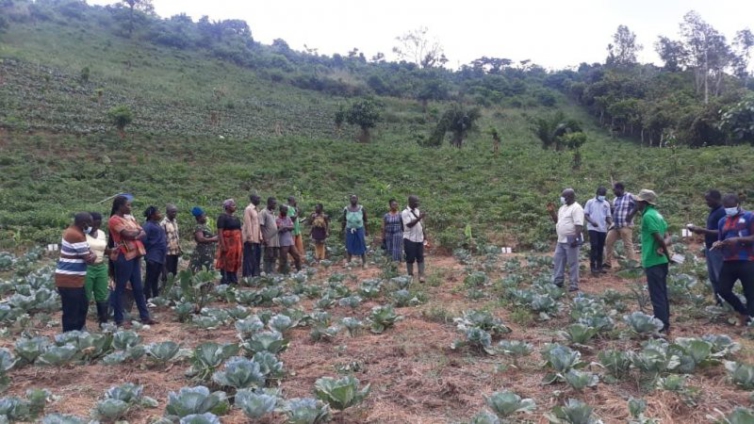A team of Research Scientists from the Centre for Scientific and Industrial Research (CSIR) under the Crops Research Institute (CRI) and Extension Officers from the Amansie Central District Agriculture Department has organized a field visit to some research-extension-farmer trial cabbage sites in the Bosome Freho and Amansie Central Districts of the Ashanti Region.
The visit formed part of efforts to promote the Modernizing Agriculture in Ghana (MAG) programme.
The purpose of the visit was to observe and assess the efficacy of some laboratory- tested insecticides (both bio and synthetic) and fungicides on the management of Diamondback Moth (DBM) and leaf blight on cabbage production.
Speaking at the sites, Mr Gyasi Boakye, the Head of Public Relations Section said the visit was a way to upgrade their knowledge and practices on pest and disease management as they had been over the years involved in cabbage production across the districts.
He said the Diamondback Moth was an insect that attacked the cabbage head and destroyed the crop, thereby affecting its growth, yield, and marketability.
He said the leaf blight also affected the cabbage, turning the leaves from green to yellow, then brown, and ultimately, reducing the suitability of cabbage head as food.
He said the Amansie Central and the Bosome Freho Districts were known to be the hub of cabbage production and it was in order to expose the farmers to the diseases that affected their income status.
''Over the years, farmers have desperately been using different agrochemicals and combinations of insecticides and fungicides but to no breakthrough'', leading to pests showing resistance, Mr. Boakye added.
He said the CSIR- CRI had assessed a number of insecticides and fungicides in the laboratory for their bio-efficacy against the diamondback moth and cabbage leaf blight respectively.
Mr Boakye said the CSIR- CRI had selected five bio and synthetic insecticides for field verification trial at Adeito in the Bosome Freho District and three at Hemang in the Amansie Central District, adding that all trial sites had three fungicides.
''The team observed that, most of the bio-insecticides and all the fungicides were doing well in managing the DBM and leaf blight'', he said.
''The resultant effect was that, there was low infestation of the pest and disease on the crop, leading to better and more vigorous growth and yields'', he added.
Professor Moses Brandford Mochiah, the Director of CSIR-Crops Research Institute, briefing the farmers, asked them to always adopt proper crop management practices to ensure a healthy environment and safe food for consumers.
He gave the assurance that the CSIR- CRI would continue to partner with the Ministry of Food and Agriculture, other agencies, and farmers, to ensure the realization of the government's objectives of achieving improved livelihoods for all Ghanaians.
Latest Stories
-
WAFU B U-17 Girls’ Cup: Black Maidens beat Nigeria on penalties to win inaugral tournament
9 minutes -
Real Madrid beat Sevilla to keep pressure on leaders Atletico
1 hour -
Liverpool put six past Spurs to go four points clear
1 hour -
Manchester United lose 3-0 at home to Bournemouth yet again
1 hour -
CHAN 2024Q: ‘It’s still an open game’ – Didi on Ghana’s draw with Nigeria
1 hour -
CHAN 2024Q: Ghana’s Black Galaxies held by Nigeria in first-leg tie
2 hours -
Dr Nduom hopeful defunct GN bank will be restored under Mahama administration
3 hours -
Bridget Bonnie celebrates NDC Victory, champions hope for women and youth
3 hours -
Shamima Muslim urges youth to lead Ghana’s renewal at 18Plus4NDC anniversary
4 hours -
Akufo-Addo condemns post-election violence, blames NDC
4 hours -
DAMC, Free Food Company, to distribute 10,000 packs of food to street kids
5 hours -
Kwame Boafo Akuffo: Court ruling on re-collation flawed
6 hours -
Samuel Yaw Adusei: The strategist behind NDC’s electoral security in Ashanti region
6 hours -
I’m confident posterity will judge my performance well – Akufo-Addo
6 hours -
Syria’s minorities seek security as country charts new future
7 hours

